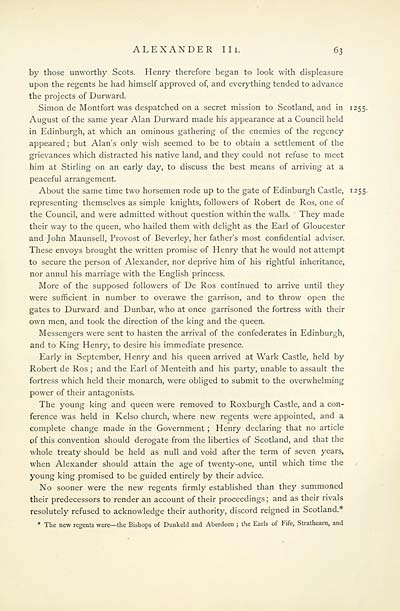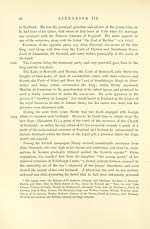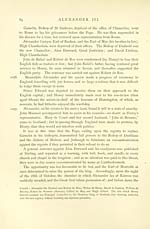Family records of the Bruces and the Cumyns
(75) Page 63
Download files
Complete book:
Individual page:
Thumbnail gallery: Grid view | List view

A L E X A N D E R 1 1 1. 63
by those unworthy Scots. Henry therefore began to look with displeasure
upon the regents he had himself approved of, and everything tended to advance
the projects of Durward.
Simon de Montfort was despatched on a secret mission to Scotland, and in 1255.
August of the same year Alan Durward made his appearance at a Council held
in Edinburgh, at which an ominous gathering of the enemies of the regency
appeared ; but Alan's only wish seemed to be to obtain a settlement of the
grievances which distracted his native land, and they could not refuse to meet
him at Stirling on an early day, to discuss the best means of arriving at a
peaceful arrangement.
About the same time two horsemen rode up to the gate of Edinburgh Castle, 1255.
representing themselves as simple knights, followers of Robert de Ros, one of
the Council, and were admitted without question within the walls. They made
their way to the queen, who hailed them with delight as the Earl of Gloucester
and John Maunsell, Provost of Beverley, her father's most confidential adviser.
These envoys brought the written promise of Henry that he would not attempt
to secure the person of Alexander, nor deprive him of his rightful inheritance,
nor annul his marriage with the English princess.
More of the supposed followers of De Ros continued to arrive until they
were sufficient in number to overawe the garrison, and to throw open the
gates to Durward and Dunbar, who at once garrisoned the fortress with their
own men, and took the direction of the king and the queen.
Messengers were sent to hasten the arrival of the confederates in Edinburgh,
and to King Henry, to desire his immediate presence.
Early in September, Henry and his queen arrived at Wark Castle, held by
Robert de Ros ; and the Earl of Menteith and his party, unable to assault the
fortress which held their monarch, were obliged to submit to the overwhelming
power of their antagonists.
The young king and queen were removed to Roxburgh Castle, and a con-
ference was held in Kelso church, where new regents were appointed, and a
complete change made in the Government ; Henry declaring that no article
of this convention should derogate from the liberties of Scotland, and that the
whole treaty should be held as null and void after the term of seven years,
when Alexander should attain the age of twenty-one, until which time the
young king promised to be guided entirely by their advice.
No sooner were the new regents firmly established than they summoned
their predecessors to render an account of their proceedings ; and as their rivals
resolutely refused to acknowledge their authority, discord reigned in Scotland*
* The new regents were— the Bishops of Dunkeld and Aberdeen ; the Earls of Fife, Strathearn, and
by those unworthy Scots. Henry therefore began to look with displeasure
upon the regents he had himself approved of, and everything tended to advance
the projects of Durward.
Simon de Montfort was despatched on a secret mission to Scotland, and in 1255.
August of the same year Alan Durward made his appearance at a Council held
in Edinburgh, at which an ominous gathering of the enemies of the regency
appeared ; but Alan's only wish seemed to be to obtain a settlement of the
grievances which distracted his native land, and they could not refuse to meet
him at Stirling on an early day, to discuss the best means of arriving at a
peaceful arrangement.
About the same time two horsemen rode up to the gate of Edinburgh Castle, 1255.
representing themselves as simple knights, followers of Robert de Ros, one of
the Council, and were admitted without question within the walls. They made
their way to the queen, who hailed them with delight as the Earl of Gloucester
and John Maunsell, Provost of Beverley, her father's most confidential adviser.
These envoys brought the written promise of Henry that he would not attempt
to secure the person of Alexander, nor deprive him of his rightful inheritance,
nor annul his marriage with the English princess.
More of the supposed followers of De Ros continued to arrive until they
were sufficient in number to overawe the garrison, and to throw open the
gates to Durward and Dunbar, who at once garrisoned the fortress with their
own men, and took the direction of the king and the queen.
Messengers were sent to hasten the arrival of the confederates in Edinburgh,
and to King Henry, to desire his immediate presence.
Early in September, Henry and his queen arrived at Wark Castle, held by
Robert de Ros ; and the Earl of Menteith and his party, unable to assault the
fortress which held their monarch, were obliged to submit to the overwhelming
power of their antagonists.
The young king and queen were removed to Roxburgh Castle, and a con-
ference was held in Kelso church, where new regents were appointed, and a
complete change made in the Government ; Henry declaring that no article
of this convention should derogate from the liberties of Scotland, and that the
whole treaty should be held as null and void after the term of seven years,
when Alexander should attain the age of twenty-one, until which time the
young king promised to be guided entirely by their advice.
No sooner were the new regents firmly established than they summoned
their predecessors to render an account of their proceedings ; and as their rivals
resolutely refused to acknowledge their authority, discord reigned in Scotland*
* The new regents were— the Bishops of Dunkeld and Aberdeen ; the Earls of Fife, Strathearn, and
Set display mode to:
![]() Universal Viewer |
Universal Viewer | ![]() Mirador |
Large image | Transcription
Mirador |
Large image | Transcription
Images and transcriptions on this page, including medium image downloads, may be used under the Creative Commons Attribution 4.0 International Licence unless otherwise stated. ![]()
| Histories of Scottish families > Family records of the Bruces and the Cumyns > (75) Page 63 |
|---|
| Permanent URL | https://digital.nls.uk/95071886 |
|---|
| Description | A selection of almost 400 printed items relating to the history of Scottish families, mostly dating from the 19th and early 20th centuries. Includes memoirs, genealogies and clan histories, with a few produced by emigrant families. The earliest family history goes back to AD 916. |
|---|

